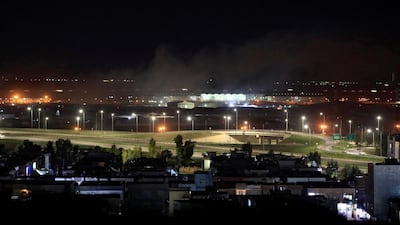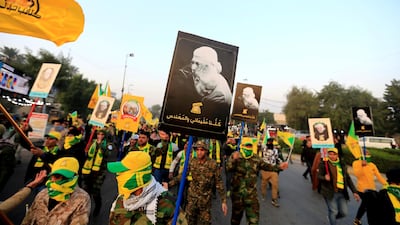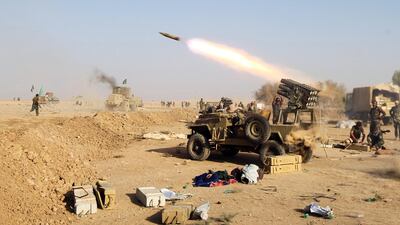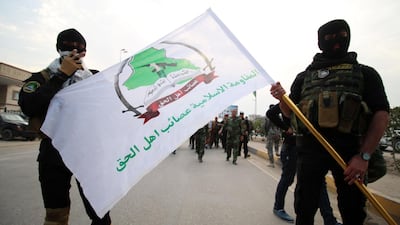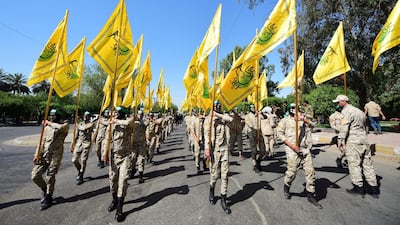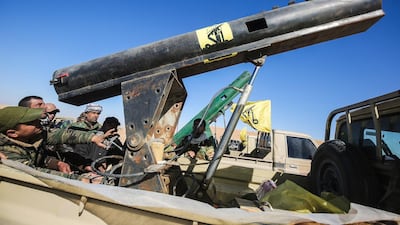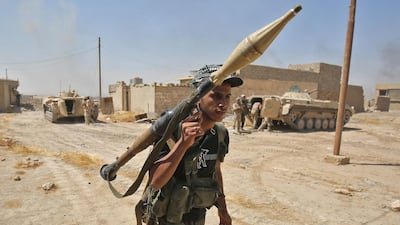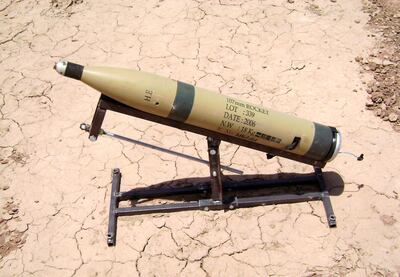Kurdish and Iraqi security officials on Wednesday were scrambling to piece together how an almost unknown group with possible ties to Iran was able to carry out a deadly raid in one of Iraq’s safest regions this week.
The two sides are conducting a joint investigation into Monday night’s attack on Erbil Airport that killed a military contractor and wounded an American soldier as well as several others, including nearby civilians.
Officials in Baghdad said the militant group had breached the border of the semi-autonomous Kurdistan region – once an island of stability and safety in the post-2003 conflict.
“There were 11 rockets that fell in Erbil which were fired from within the borders of the region, they were launched from two areas in Erbil," Iraqi army spokesman Maj Gen Yehia Rasool said on Wednesday.
Maj Gen Rasool suggested the rockets were launched only five kilometres from the centre of the Kurdish region's capital.
“Kurdish security forces must investigate the breaches,” he said.
While several government and security units in Erbil uncovered evidence to support the claim, some officials in the administration refuted allegations that the rockets were launched from federal Iraq.
The Hashd Al Shaabi or Popular Mobilisation Forces are government-sanctioned paramilitary groups formed to fight ISIS. Many are trained, funded and tied to Iran and have been accused of attacks on international forces.
The exact location of the launch site has not been made public and although security analyst Alex Almeida said it was "95 per cent likely" the operation was launched from Kurdish territory, there was a small possibility both sides are correct.
"There's still a very small possibility there were two separate strikes, one involving long-range 122mm [rockets] fired from the outside the Kurdish forward line of control and the other using 107mm [rockets] from the Erbil outskirts," he told The National.
The Kurdish interior ministry said late on Tuesday that it had located a vehicle they suspected was used to fire the rockets.
"The vehicle was a Kia and it was between Erbil and Gwer," the ministry said.
Kurdish intelligence services found Iranian Fajr-1 rockets still intact at the launch site, which was reportedly in the Kurdish region of Iraq.
A militant group, known as the Guardians of Blood Brigade, said it fired 24 rockets that avoided the airport’s defences, specifically naming an automatic machinegun known as a C-Ram that protects US installations in Iraq.
“The American occupation will not be safe from our strikes in any inch of the homeland, even in Kurdistan, where we promise we will carry out other qualitative operations,” the claim said, according to the Site Intelligence Group.
Security gaps?
Experts believe that there are security gaps in the perimeter of the Kurdistan region's borders and smuggling has always been an issue.
"It is likely that whichever group conducted the rocket attack used smugglers to bring in the rockets and set up the launch in an area which has only a light security presence," said Sajad Jiyad, a Baghdad-based fellow with the Century Foundation.
The exact target was the Harir base, where US and other international forces are housed next to Erbil International Airport, he told The National.
“The type of rockets used were inaccurate short-range ones, which is why some landed in residential areas,” he said.
“The message is that American troops can be targeted anywhere,” Mr Jiyad said.
The Kia Bongo lorry found by Kurdish authorities and used as the launcher is likely to have blended with market traffic, Mr Almeida tweeted.
Although the attack was aimed at US forces, the Kurdish government considers it to be a strike on the region's security, a Kurdish official from Erbil told The National.
"We take this as an attack on the Kurdistan region, our interest, our allies and people who share responsibility to protect Kurdistan and fight a common enemy,” he said.
“The attacks were conducted by those who are not happy with our political, economic, diplomatic and social development and are trying to sabotage the progress,” he said.
Iranian arms exports
While some observers are uncertain about whether Iran intentionally supplied the rockets, other analysts seemed certain the weapons were Fajr-1 107mm rockets of Iranian origin.
"While the 107 was abundant in other variants, we did see brand new 120/122mm rockets made in Iran, identified from their markings," said Craig Whiteside, a retired colonel and Iraq war veteran who now teaches at the US Naval War College.
At the time, Iran was smuggling the weapons over the border in large numbers to some of the same militias now at odds with coalition forces.
Iranian Fajr-1 rockets were so ubiquitous, British and US reports published identification guides that showed highly distinctive markings on the devices, contrasting them with other variants of the rocket, which were made in China.
"Sometimes the jerry-rigged launchers they used would fall over in mid launch and we could capture remnants not fired or find them in caches," Mr Whiteside said, which could explain how Kurdish forces found intact rockets.
Captured Fajr-1 rockets, manufactured by the Iranian Armament Industries Group, all have the same markings: calibre, lot number, year of production and net weight and another code "R. No.", which is almost always handwritten.
Weapons captured by US forces in previous incidents, going back to the early part of the Iraq occupation, are identical to those used in the attacks on Monday night.
Iran denied the attacks, but according to a report by the Small Arms Survey, by transferring such large quantities of Fajr-1 rockets to Iraq, production companies would have been well aware of the end use, especially since the weapons were previously used to attack the coalition.
"The Iranian government is culpable for the acquisition and use of these weapons in Iraq and elsewhere," the report concluded.
